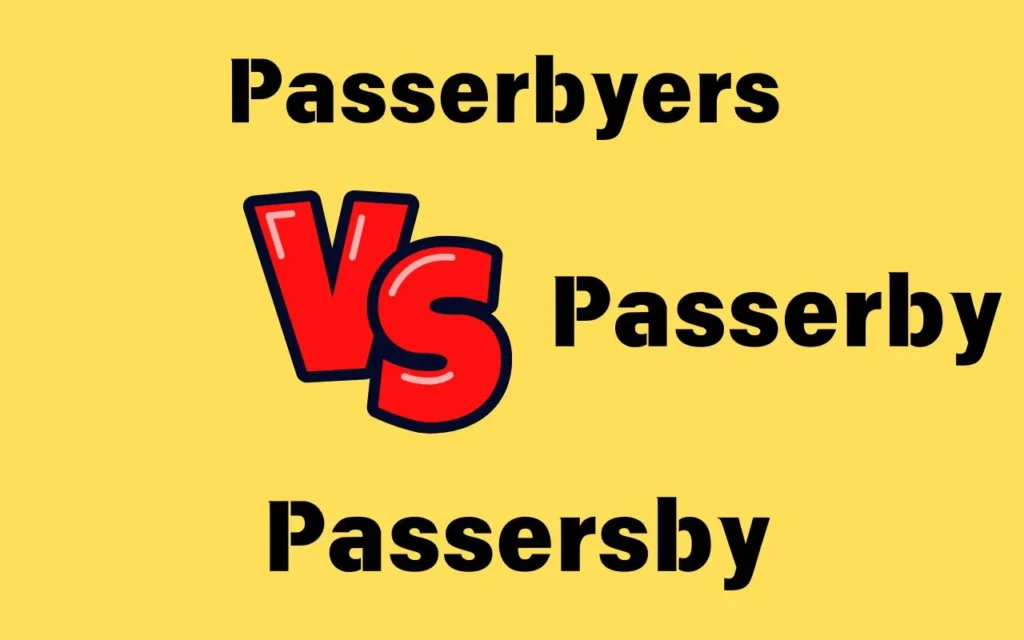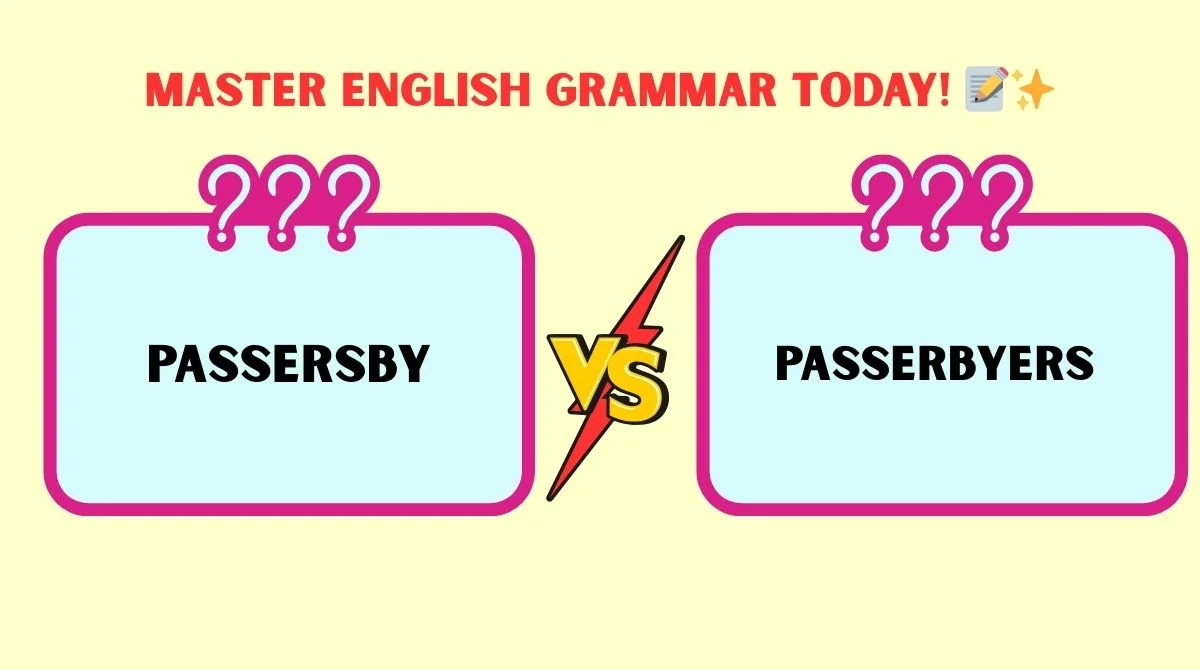Last updated on September 23rd, 2025 at 08:34 am
English can be confusing, especially when it comes to unusual plural forms.
One word that often stumps people is passerby. Should you say passerbyers, passersby, or just passerby? If you’ve ever hesitated over this, you’re not alone.
This guide will break it all down for you, exploring the origins, proper usage, and why “passersby” is the correct plural form.
Understanding “Passerby”: Definitions and Origins
To fully understand the confusion, let’s first define passerby.
- Passerby (noun): A person who happens to be passing by, typically on foot.
Example: “A passerby helped the injured cyclist.”
Origins:
- The word passerby is a compound noun made up of two parts:
- Passer: Someone who passes or moves along.
- By: A preposition indicating closeness or movement near something.
- Together, passerby refers to someone passing by a specific location.
Interestingly, this structure follows a pattern common in English for creating nouns from verbs and prepositions, such as go-between or runner-up.
Passerbyers, passersby, or passerby—which one is correct? Learn the proper singular and plural forms of this commonly misused word and never mix them up again!
Pluralizing “Passerby”: Common Mistakes to Avoid

The pluralization of passerby often trips people up because it doesn’t follow standard rules. Unlike most English nouns, where adding -s to the end makes them plural, passerby pluralizes differently.
- Correct plural form:Passersby
- The pluralization happens with the first word (passer), while by remains unchanged.
Example: “Several passersby witnessed the accident.”
- The pluralization happens with the first word (passer), while by remains unchanged.
- Incorrect forms:
- Passerbyers: This form is entirely incorrect and not recognized in English.
- Passerbys: While it may seem logical to add -s to the end, this is also incorrect because it doesn’t follow the compound noun’s pluralization pattern.
Key Tip: Focus on pluralizing the primary noun (passer) in compound words like these.
The Incorrect Form “Passerbyers” and Why It’s Used
Despite being incorrect, the form passerbyers still pops up frequently in informal settings. Why?
Reasons for Misuse:
- Overgeneralization of Plural Rules:
English learners often apply the standard -s or -es plural rule to the entire word without realizing the compound structure. - Phonetic Similarity:
The extra -ers in passerbyers may feel natural to some because it mirrors other plurals like engineers or bakers. - Lack of Familiarity with “Passersby”:
Since passersby isn’t commonly used in casual conversation, people sometimes create their own version based on intuition.
Important Note: While it’s easy to see why passerbyers might seem correct, it’s important to stick to passersby to maintain proper grammar and usage.
Hyphenation and Its Role in “Passersby”
You might wonder: Does passerby need a hyphen?
Hyphenation in Compound Nouns:
- Historically, compound nouns like passerby were hyphenated (passer-by). Over time, the hyphen was dropped, and the word became a single entity.
- Modern Usage: The unhyphenated form (passerby) is now standard in both American and British English.
However, when writing formally or stylistically, always check the style guide you’re following. Certain older texts may still use passer-by.
Fun Fact:
The hyphenated form might actually help clarify pluralization, making passers-by more visually intuitive. This form is still correct but less common today.
Correct Usage: Why “Passersby” is the Standard Form
When in doubt, remember: The correct plural form is passersby.
- Why it’s correct:
- The word passerby is a compound noun, and in English, compound nouns often pluralize the first word while leaving the second word unchanged.
- Other examples:
- Attorney general → Attorneys general
- Mother-in-law → Mothers-in-law
- Grammar Tip: When pluralizing, always identify the main noun in the compound and apply the plural form there.
Examples in Sentences:
- Incorrect: “Passerbyers gathered around the scene.”
- Incorrect: “Passerbys reported the incident.”
- Correct: “Several passersby stopped to offer assistance.”
Real-World Examples: “Passersby” in Use
Seeing a word in action often solidifies its meaning and proper usage. Here are some examples from real-world contexts:
- Media Reports:
“Passersby alerted authorities to the fire, helping prevent further damage.” - Everyday Conversations:
“A group of passersby stopped to watch the street performer.” - Literature:
“The passersby hurried along, unfazed by the rain.”
Tip for Writers: Whenever you’re unsure, substitute passerby with synonyms like pedestrian or onlooker. While not exact equivalents, they can often clarify the context.
The Evolution of Language and “Passersby”
Language is constantly evolving, and so are the ways we pluralize words. Historically, the pluralization of compound nouns followed strict rules, but modern usage is often influenced by convenience and common practice.
Why “Passersby” Endures:
- Its structure aligns with traditional grammatical rules.
- It reflects clarity and precision in formal writing.
However, as informal language and digital communication grow, incorrect forms like passerbyers may appear more frequently. It’s important to resist the temptation to conform to incorrect usage, especially in professional or academic contexts.
Quote:
“Good grammar is credibility, especially on the Internet. In an era of text-speak, knowing the difference between ‘passerbyers’ and ‘passersby’ sets you apart.”
FAQs
What is the singular form of “passersby”?
The singular form of “passersby” is “passerby,” which refers to a single person passing by a location.
Why is “passersby” the correct plural form?
“Passersby” is correct because in compound nouns, the primary noun (passer) is pluralized, while the second part (by) remains unchanged.
Is “passerbyers” a correct word?
No, “passerbyers” is incorrect. It doesn’t follow English grammar rules for pluralizing compound nouns like passerby.
Can I use “passerbys” instead of “passersby”?
No, “passerbys” is also incorrect. Always use “passersby” as the plural form of passerby.
Are hyphenated forms like “passer-by” still used?
While older texts may use “passer-by,” modern English typically uses the unhyphenated form, “passerby.”
What are synonyms for “passersby”?
Synonyms include pedestrians, bystanders, onlookers, or observers, depending on the context of your sentence.
Conclusion
So, which is correct: passerbyers, passersby, or passerby? The answer is clear:
- Passerby is the singular form, referring to one person passing by.
- Passersby is the correct plural form, used for multiple people.
- Passerbyers is entirely incorrect and should be avoided.
By understanding the rules of compound nouns and practicing their proper usage, you’ll never confuse these terms again.
Whether you’re writing a blog post, a formal letter, or just chatting with friends, remember that passersby is the gold standard for pluralization.
